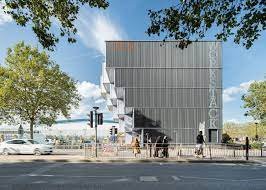I founded changebuilding in 2016 to use my experience to help others make meaningful progress towards sustainable development in the built environment, with a particular focus on climate change.
Rather than competing with others, I collaborate across industries to research, design and help deliver more innovative, sustainable and resilient projects. I am supported by long-lasting collaborators, consultants and in-house staff assembled to suit the nature of each project.
Work
-

Bayesian Belief Networks (BBN)
I’ve been exploring ways to assess the significance of different linkages between issues in more complex systems. I was pleased to attend a workshop with colleagues at The University of Southampton on predicative modelling using R to map and assess systems using BBN approaches.
This trial was of the housing crisis and the impact of delivering the 300,000 homes a year and the consequences for quality and carbon.
-

Charlton WorkStack wins at The Wood Awards 24
I’m very pleased that Charlton WorkStack won (1.5 times) at the Wood Awards, one in the best commercial project and a highly commended din the engineering sections.
I know awards are not always a function of actual quality, but The Wood Awards do focus on that and not just flogging table spaces.
TDUK have done a good case study write up of the project on the link below.
-

Biomaterials in a Circular Economy
I’ve finally submitted my chapter for the forthcoming Buildings as Material Bank book.
I’ve suggested that the selection not just circulation of materials is essential for ecological consistency and under-emphasised element of The Circular Economy.
The way way The Circular Economy is often represented, with the literal interpretation of perfectly closed cycles, is also misleading to me with no really grasp of the inevitable losses in material and energy. So I’ve had a go at that as well.
-

Estate Environmental Sustainability Framework
Therefore many examples of these at the moment. With my friend, Rob Colley, we have tried to link estate and project decarbonisation to the business case to make the decision making clearer for clients.
Assessments often start with business as usual (do nothing) scenarios and it is informative to look back as well as forward with those to see the scale of impact of grid decarbonisation and the challenge of legacy fossil fuel systems on many estates.
Decision making however is a little harder than simply using a heat pump, especially with the reality of often constrained budgets.
-

New European Bauhaus project self assessment
I worked as sub area expert in bio-based materials and offsite systems within the emerging technologies group for this study and supported by Elizabeth Kaethner with valuable research.
The NEB mission is extremely forward looking and the guide tries too capture how we evaluate beauty and inclusivity, not just sustainability.
-

NG200
I developed the bespoke framework and targets to suit The Gallery’s strategic plan and help them on their path towards net zero carbon for the project.
The work help inform the business case and the technical solutions developed by the design team across key environmental sustainability themes.
The project is an important investigation into how to improve the performance of listed heritage assets and de-risk future climate impacts.
I’m looking forward to there-opening of The Sainsbury Wing in 2025.
-

Homelessness
I supported UCL, John McAslan and Dolphin Living with advice on offsite methods for this important study in 2023.
Many of the findings are just as informative to addressing the current housing crisis in the UK as they are specifically about tackling homelessness and associated health issues.
-

Climate Shock
I wrote this essay when working as a Royal Academy of Engineering Visiting Professor of sustainable development and climate impact at The University of Southampton. It was to help me get my ideas together about how to close the gap between the future challenge and the existing curriculum; essentially how to respond to the shock of the awareness of humans as agents of The Anthropocene.
It was to accompany my inaugural lecture that was unfortunately cancelled due to Covid.
-

Refocusing MMC on the Climate Emergency
I wrote the joint paper with Prof Robert Hairstans of Napier University and Giuilia Jones of MACE for the September 2020 issues of The Structural Engineer. It suggests how Offsite Manufacturing (OSM) - I never did like thew term MMC - might be refocused to address issues of the climate crisis.
It’s free to download from the link below.
-

Sustainable Construction and Decarbonisation
I help consultants and contractors on their own sustainability and decarbonisation journey.
This might be supporting internal programmes, assisting with bids our helping develop approaches.
Through multiple engagements across for both building and infrastructure I help teams develop an understanding and broader competence in approaches with practical outcomes.
-

Manufacturing buildings for people and planet
Adrian co-authored this paper for The Structural Engineer futures edition in January 2020 with Matt Cooper of Arup and Andrew Waugh of Waugh Thistleton Architects.
The paper explains different approaches to offsite construction and why climate change has to become a much more central issue in approaches not just productivity.
The paper can be downloaded from the link below
-

Mass timber in The Circular Economy
I wrote this paper when I was a bit fed up just hearing about extractive industries and their approaches. I wasn’t sure I understood how different much of what was being talked about was different to established sustainability approaches.
So like much of the self-funded research I do, its was as much about learning than what I already knew.

